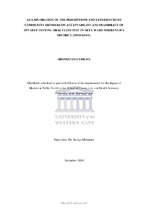| dc.description.abstract | Background: The identification of undiagnosed HIV positive individuals through HIV testing services is one of the key measures in ensuring that the UNAIDS/ WHO 90 90 90 targets are achieved by the year 2020. The identification and subsequent initiation of HIV positive individuals on ART helps to minimise or prevent HIV transmission following viral suppression. Around 25% of people living with HIV globally are unaware of their positive status. In many countries, critical gaps exist in HIV services including prevention, testing and treatment. In Africa, the East and Southern region has a high burden of HIV/ AIDS where 50% of people are living with HIV, with 800,000 new infections in 2017. Despite concerted efforts in rolling out HIV testing services in Zimbabwe, a significant number of the population, especially men and young people, remain with an unknown HIV status, which is hindering progress towards the control and prevention of the HIV pandemic. A recent study confirmed that HIV testing in men is lower as compared to women. Consequently, progress is slower in trying to achieve the year 2020 milestone. The identification of suitable options for reaching out to these groups and the general population is important to achieve a reduction HIV prevalence. HIV self-testing oral fluid sample is thought to have the capacity to increase uptake of HIV testing. However, it still requires evidence on its acceptability and feasibility for those with undiagnosed HIV.
Aim: The aim of this study was to explore the perceptions and experiences of the accessibility and feasibility HIV self-testing kits for individuals who received and used this method in Neta ward in Mberengwa District, Zimbabwe. The study identified some key factors that led to individuals accepting the kits and using them. The findings of this study will hopefully be able to inform policy makers’ decision-making about the importance of rolling out HST in the country. | en_US |

